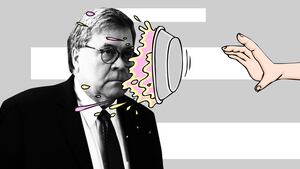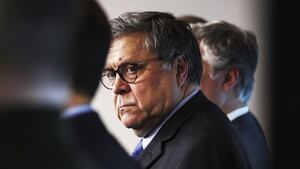To some House Democrats, it’s almost as if Attorney General Bill Barr lives to troll them.
Late Friday night, Barr sent his latest shockwave through the political world by announcing that the New York-based prosecutor who is conducting some of the most sensitive investigations into President Trump and his inner circle would be stepping down and replaced by a Trump appointee. That move came weeks after Barr reportedly personally oversaw the clearing of Black Lives Matter protesters from the White House with tear gas. Before that, his Department of Justice dropped the criminal case against Michael Flynn, the former Trump national security adviser who had pleaded guilty to lying to FBI agents about his contacts with Russia in 2016. And before that, the DOJ prosecutors on Roger Stone’s case resigned en masse when DOJ brass scuttled their sentencing recommendation and forced a more generous one.
Beyond that, Barr has ignored subpoenas for his testimony before House lawmakers, and he has indefinitely blown off a date—scheduled for March and later postponed to June—to testify in front of the House Judiciary Committee.
The attorney general’s pronounced and extremely extended middle finger has put House Democrats in a bind, caught between a desire from some to pursue the most aggressive options available to counter Barr—including impeaching him—and concerns from another wing of the party that is wary of the political costs of aggressively going after an administration they believe is headed for defeat in November anyway.
Attempting to navigate this dilemma yet again is Rep. Jerry Nadler (D-NY), the Judiciary Chairman tasked most directly with overseeing the Department of Justice. Appearing on CNN on Sunday, Nadler dismissed the notion of impeaching the attorney general—an idea championed by Sen. Elizabeth Warren (D-MA) and entertained by members of his own committee—as a “waste of time” because the “corrupt” GOP-held Senate wouldn’t remove Barr from office. Nadler told Jake Tapper that the committee would pursue other tactics, like advancing legislation that aims to decrease funding to his office. And on Monday, Axios reported that the chairman would move to subpoena Barr for testimony on July 2.
But Nadler’s dismissal of impeachment landed poorly among some members of his own party, including members of Judiciary, who have said they would like to see the entire oversight toolbox on the table. Impeachment is a power Congress retains, though one it has used exceedingly rarely. But, these members argue, the times call for extraordinary reactions.
“It’s possible he’s going to keep engaging in outrageous conduct,” Rep. Ted Lieu (D-CA), a Judiciary member, told The Daily Beast. “We are going to keep investigating Bill Barr’s outrageous conduct and see what we uncover… I wouldn’t foreclose any options before we have even really started an investigation.”
On a call Monday evening, staffers on the Judiciary Committee discussed options for how to move forward with respect to Barr. While some advocated for taking more aggressive actions for getting him in front of Congress, others said going after the attorney general would expend too many resources. In general, some Democrats close to the Judiciary Committee have come away with the impression that leadership at the committee and the caucus believe that they don’t have time to impeach Barr before November’s election.
House Democrats are all too familiar with the challenge of conducting oversight of an administration that rejects it alongside a Senate that is run by a Republican Party that doesn’t seem particularly interested in it. But the brazenness of Barr’s recent moves, and of his disregard for House Democrats’ oversight in general, has put pressure on them to demonstrate they understand the urgency of the moment—if only for setting benchmarks about acceptable conduct.
“Bill Barr is not on the ballot,” said Rep. Jared Huffman (D-CA), an early supporter of Trump’s impeachment. “This is not about a presidential election, it’s about the rule of law… our oath of office just compels us to do our job. That job starts with the investigation. If it highlights impeachable conduct, we should follow that path, without fear or favor.”
Many Democrats believe Barr's abrupt Friday night announcement about changes at the U.S. Attorney’s office for the Southern District of New York were a dangerous new low, even for an official whose conduct has alarmed them for over a year. Up to that point, Geoffrey Berman, the U.S. Attorney, had been conducting investigations that have rattled Trumpworld—including probes into Rudy Giuliani, the president’s personal lawyer, that have the potential to surface potentially damaging new information.
After Barr announced Berman would be replaced with Securities and Exchange Commissioner Jay Clayton, a lawyer who Trump appointed, Berman shot back saying he wouldn’t leave office until the Senate had confirmed a successor. On Saturday, Barr announced that Berman was formally being fired by the president and that his deputy would take his place.
After seeing the news break on Friday night, Lieu said that it crossed his mind immediately that SDNY must have been working on “one or more investigations or cases that Donald Trump does not want to come to light.” He and other lawmakers believe that Berman would be open to testifying before Congress about why he may have been sacked.
Even prior to the latest episode, Nadler had scheduled a Wednesday hearing in House Judiciary about politicization at DOJ—which will feature two former prosecutors. The chairman floated on CNN that Berman may testify then, but no such appearance has been announced yet.
“The most important thing is we immediately get to the bottom of what happened here,” said Huffman. “If it’s every bit as craven as it looks, people might take a second look at impeachment. Even though Chairman Nadler has been a bit dismissive of that, things have a way of changing if the facts present themselves so irrefutably.”
The tensions that Nadler confronts over how to handle Barr are neither new nor novel. During the Obama years, House Republicans demanded the impeachment of then-Attorney General Eric Holder for what they argued was his failure to comply with oversight requests related to the investigation into the Fast and Furious gun running probe. Amid pushback from leadership, they ultimately settled on holding Holder in contempt of Congress.
In the run-up to Trump’s own impeachment, meanwhile, it was members of the Judiciary Committee, along with the more progressive members of the caucus, who pushed for removal of the president while party leaders, and more vulnerable lawmakers, warned about the possible political costs. The Ukraine revelations in September ultimately shook that stalemate loose and launched the impeachment inquiry. But it seems like that internal caucus tension remains.
Privately, a faction of the party has warned that the impeachment process showed that Democrats’ oversight efforts would amount to little until Trump was defeated, or they flipped control of the Senate, or both. Publicly, lawmakers like Huffman and Lieu say it would be reckless to rule any remedy out.
“I know Congress doesn’t want to take it on, but it’s a really big deal,” said Molly Claflin, a former Senate Democratic staffer for the Russia investigation and now an attorney with the watchdog group American Oversight. “I know Chairman Nadler is saying impeachment is a waste of time, Democrats are tired, and that oversight space has shrunk because this administration doesn’t cooperate, but I believe this view takes a shortsighted view of the role of Congress.”
“Congress is acting as if the end of the impeachment trial, or the election in five months, means the end of oversight into Trump,” she went on. “We may have four more months or four more years of Trump, but Congress has a responsibility to get to the truth.”









